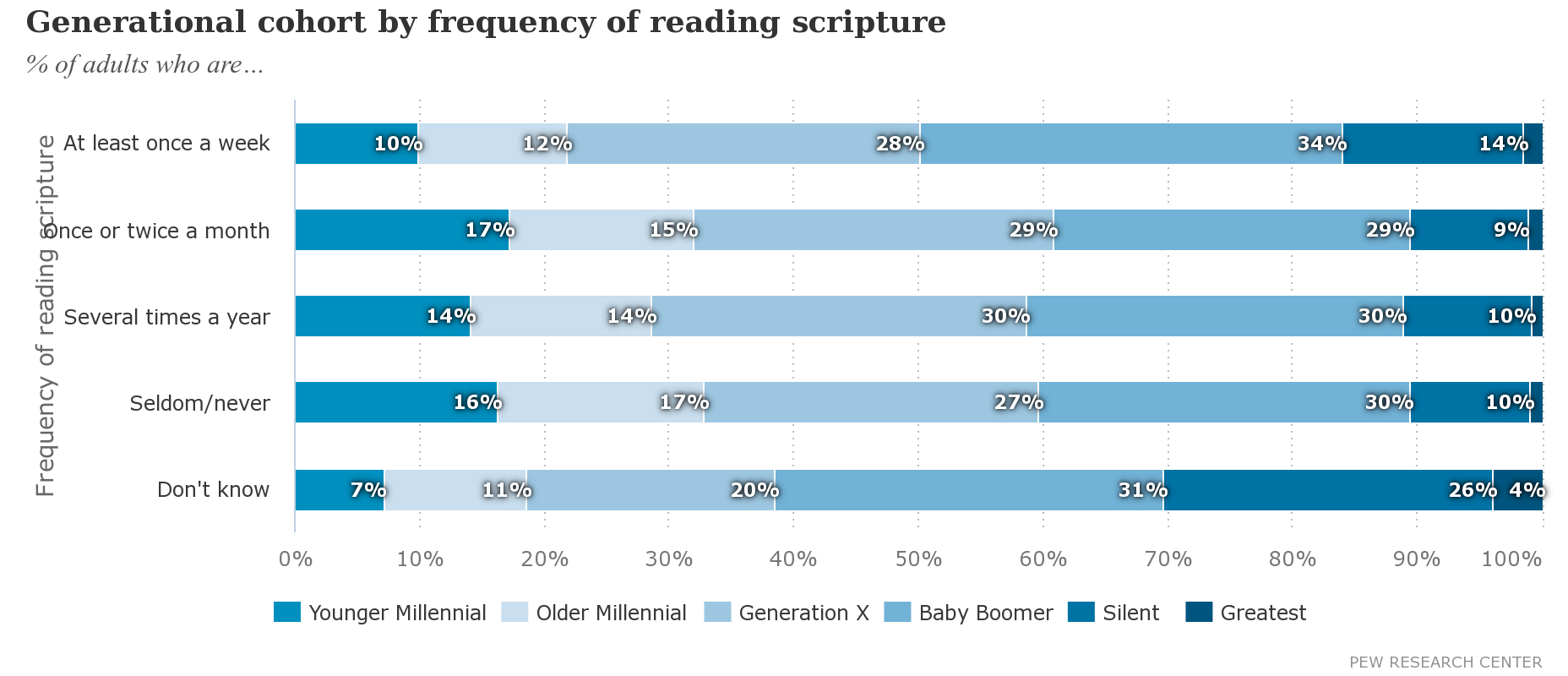Millennial biblical literacy exceeding other generations
Pew Research Center’s Religious Landscape Study contains helpful insights about Americans and their view of the Bible and other religious texts. Though doctrinal positions vary across denominations concerning Scripture, Christians typically regard the Bible as authoritative for faith and practice. It is read in services of worship, as part of Sunday school classes or Bible studies, and congregants are often encouraged to read the Bible individually as a devotional practice.
When Easter and Passover aligned this year, Pew chose to share a few of their most significant findings from the 2014 study. Here are five notable conclusions:
About a third of Americans (35%) say they read scripture at least once a week, while 45% seldom or never read scripture. (This finding is inclusive of the Bible and sacred texts from other religious traditions.)
Three-quarters of Christians say they believe the Bible is the word of God.
Christians, who make up a majority of U.S. adults (71%), are divided over how to interpret the Bible.
In 2014, about four-in-ten Christians (42%) said reading the Bible or other religious materials is an essential part of what being Christian means to them personally.
Seven-in-ten Americans (71%) know the Bible teaches that Jesus was born in Bethlehem.
Pew also broke down frequency of scripture reading by generational cohorts, finding that 34% of Baby Boomers and 28% of gen X-ers read scripture weekly, while 22% of all millennials engage in weekly reading of a sacred text.
(“Frequency of reading scripture,” 2017)
In 2016, Christianity Today reported on research from the American Bible Society (ABS) and Barna Research Group that found practicing millennial Christians to exhibit biblical literacy either equal to or surpassing that of older generations, and also found that a higher percentage of practicing millennials believe the Bible to be the literal or inspired word of God. The ABS and Barna study defined a practicing Christian as someone who identified as Christian, declared their faith as being personally important, and had attended a church gathering within a month of being surveyed.
I have found millennials and members of generation Z to be open to exploring the Bible. I have heard millennials express a strong personal desire to know the Scriptures and learn how to live according to the way of Christ. When I asked these Christians if they had ever been taught a method or approach to studying the Bible, they most often reported they had not. Their youth and college leaders modeled ways of engaging the Bible, but seldom slowed down enough to demonstrate how to ask questions of Scripture, interpret the Bible faithfully, and then to discern and identify ways of living in faithful accordance to God’s will as revealed in and through Scripture.
In your ministry, how do you equip millennials and members of generation Z with an approach to reading the Bible, interpreting the text, and living according to God’s self-revelation through the Word? How do you acknowledge legitimate questions and potential doubts while also offering a listening ear, compassionate friendship, and compelling answers to the great mysteries of Christian faith?
Both studies I have cited did find an increase in skepticism and an erosion of confidence in the Bible. But it should be noted that the rise in skepticism may also ignite an increased desire among committed Christians to know and understand the Bible so that they might present it winsomely and with love to their peers. The desire to know the Bible may not only be born of a longing for personal growth and faith development, but perhaps also from love of friends and neighbors.
Emerging generations are more open than you may realize to the Bible. Help them to understand the Scriptures and to see how they help us to know God, encounter Christ, and to grow in faith.


